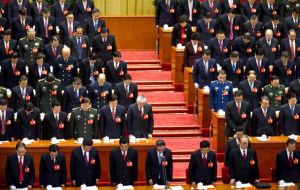MercoPress. South Atlantic News Agency
China begins secret meeting to decide reforms and course of next decade
 Official press has said the meeting “pools the wisdom of the whole Party and from all aspects” but cautioned about results
Official press has said the meeting “pools the wisdom of the whole Party and from all aspects” but cautioned about results China began a four-day secret meeting on Saturday to set a reform agenda for the next decade as they try to push more sustainable growth after three decades of breakneck expansion. But analysts have cautioned against expectations for big changes as they say stability remains the watchword for the leadership.
President Xi Jinping and Premier Li Keqiang must unleash new growth drivers as the world's second-largest economy loses steam, burdened by industrial overcapacity, piles of debt and soaring house prices.
The meeting - held under tight security at a Soviet-era hotel in western Beijing - will show just how committed the new leadership is to reform after formally taking power in March.
Economic reforms will dominate the meeting of the 205-member Central Committee of China's ruling Communist Party. Little if any news will be released during the event, but official news agency Xinhua traditionally issues a dispatch on the last day.
Xinhua confirmed in an English-language dispatch that the meeting had begun, with the agenda led by a discussion over a draft document on deepening reform, “which pools the wisdom of the whole Party and from all aspects”. It added: “Comprehensively deepening reform means the reform will be more systematic, integrated and coordinated.” It gave no other details.
The Development Research Centre, a think-tank for China's cabinet, set out last month eight key areas for reform at the plenum - finance, taxation, land, state assets, social welfare, innovation, foreign investment and governance.
Powerful interest groups, including leftists or conservatives, local governments, state-owned enterprises and state banks, oppose some of the reforms such as freeing up interest rates, allowing private banks and turning Shanghai into a free trade zone, several sources say.
However, the party will put on a unified face once Xinhua issues its communiqué at the end of the plenum on Tuesday, pledging reform without providing too many details.
The People's Daily's influential tabloid, the Global Times, cautioned in an editorial on Saturday that the country's leaders would be unlikely to live up to the huge expectations.
“They can hardly be as ambitious as some sections of the public hope. The most ambitious government in terms of reforms would still be considered conservative when faced with these expectations,” it wrote.




Top Comments
Disclaimer & comment rules-

-

Read all comments“secret meeting to decide reforms” has to make you laugh really.
Nov 09th, 2013 - 08:42 pm 0My figures are at least a year out of date, but the top 660 US office holders from all branches of government are worth about US$7.5 billion, In China the top 70 add more than that PER YEAR and are worth a staggering US$89.8 billion.
China is now a plutocracy so reforms will only be made that extend that wealth and help grow it. If it helps the poor plebs churning out gee-gaws for the west then it is either purely coincidental or bread and circuses to keep them placated.
Funnily enough the biggest disincentive to having children for many in Chinese cities these days is not the One Child a policy but the expense of having children. China's TFR is nearly the same as Japan's at about 1.2 and everyone harps on about Japan's economic decline which is made worse by this low birthrate. However in Beijing and Shanghai the TFR is estimated at between 0.6 and 0.8.
China is supposedly the world's next superpower and economic juggernaut for so many and yet it is demographically worse than the last country that wore this tag, Japan.
What's the bet this issue isn't tackled and 'reformed'.
I read an article that these huge quickly build ghost cities are crumbling from poor construction and lack of maintenance.
Nov 12th, 2013 - 01:10 pm 0Much like their Society and Economy.
Soon enough the bloody provincial riots will reach the east coast cities and there will be revolution.
My guess is we will see this in the next decade as food and jobs become more scarce.
Commenting for this story is now closed.
If you have a Facebook account, become a fan and comment on our Facebook Page!